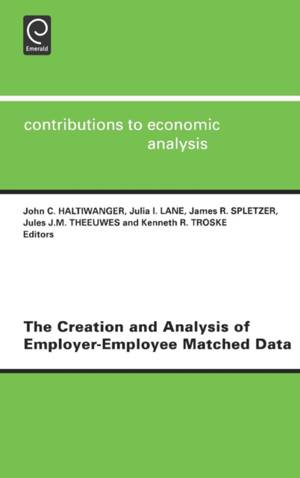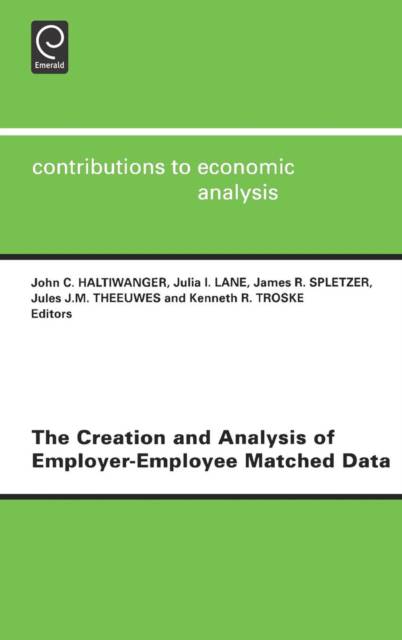
Bedankt voor het vertrouwen het afgelopen jaar! Om jou te bedanken bieden we GRATIS verzending (in België) aan op alles gedurende de hele maand januari.
- Afhalen na 1 uur in een winkel met voorraad
- Gratis thuislevering in België
- Ruim aanbod met 7 miljoen producten
Bedankt voor het vertrouwen het afgelopen jaar! Om jou te bedanken bieden we GRATIS verzending (in België) aan op alles gedurende de hele maand januari.
- Afhalen na 1 uur in een winkel met voorraad
- Gratis thuislevering in België
- Ruim aanbod met 7 miljoen producten
Zoeken
The Creation and Analysis of Employer-Employee Matched Data
€ 406,45
+ 812 punten
Omschrijving
This book consists of a selected subset of papers presented at the International Symposium of Linked Employer-Employee Data, held in Washington DC, in May 1998 - to address the creation and analysis of such matched data in an environment that safeguards respondent confidentiality. The conference brought together a wide range of social scientists and statisticians from more than 20 countries. Three broad themes are highlighted: the analysis of linked employer-employee data (The basic finding of this and the next section is that the firm matters a good deal in explaining the differences in earnings, productivity, and work experiences of individual workers. Linked data allow the researcher to disentangle the firm effects from the worker effects). It also highlights the themes: econometric issues involved with the analysis of such data (Creating and analyzing employer-employee matched data sets presents a number of new econometric problems that are not present in standard micro-data sets containing just workers or just employers. However, these data also offer us a unique opportunity to examine the effects of some of the econometric problems involved in using the other data sources. The chapters in this section address both of these issues. The first two chapters examine new econometric issues involved in the creation and use of matched data sets, while the second two chapters use matched data to examine possible problems with cross-sectional or panel data on workers. The results from each of these chapters will be valuable to all empirical researchers, regardless of whether they are using employer-employee matched data or more standard cross-sectional or panel data sets). It also highlights the theme: ongoing efforts aimed at creating large-scale linked employer-employee data (The last section of this book describes four recent efforts at creating linked employer-employee data through surveys of firms and individuals).The first two chapters describe an "employers first" methodology of creating linked employer-employee data, and the last two chapters describe an "employees first" methodology. The two "employees first" surveys described here are, as far as known, the only two large-scale surveys in production that follow this design. Each of the four chapters in this section describes details about the design and field operation of the survey that will be indispensable to others who might want to create or analyze linked employer-employee survey data. The 23 chapters in this book provide a glimpse into the future of labor economics and industrial organization. It can be said that labor economics and public policy around the world has been dominated over the past several decades by quantitative analyses based upon public-use US micro-data. In the future, it is very likely that economics and social policy in the United States and elsewhere will depend on quantitative analysis based on linked employer-employee micro-data currently residing in all continents of the world.
Specificaties
Betrokkenen
- Uitgeverij:
Inhoud
- Aantal bladzijden:
- 628
- Taal:
- Engels
- Reeks:
- Reeksnummer:
- nr. 241
Eigenschappen
- Productcode (EAN):
- 9780444502568
- Verschijningsdatum:
- 13/09/1999
- Uitvoering:
- Hardcover
- Formaat:
- Genaaid
- Afmetingen:
- 156 mm x 234 mm
- Gewicht:
- 1047 g

Alleen bij Standaard Boekhandel
+ 812 punten op je klantenkaart van Standaard Boekhandel
Beoordelingen
We publiceren alleen reviews die voldoen aan de voorwaarden voor reviews. Bekijk onze voorwaarden voor reviews.











